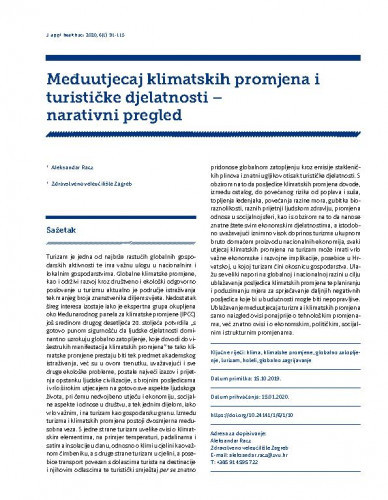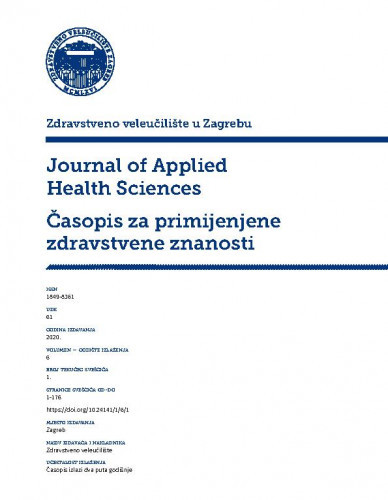Turizam je jedna od najbrže rastućih globalnih gospodarskih aktivnosti te ima važnu ulogu u nacionalnim i lokalnim gospodarstvima. Globalne klimatske promjene, kao i održivi razvoj kroz društveno i ekološki odgovorno poslovanje u turizmu aktualno je područje istraživanja tek manjeg broja znanstvenika diljem svijeta. Nedostatak šireg interesa izostaje iako je ekspertna grupa okupljena oko Međunarodnog panela za klimatske promjene (IPCC) još sredinom drugog desetljeća 20. stoljeća potvrdila „s gotovo punom sigurnošću da ljudske djelatnosti dominantno uzrokuju globalno zatopljenje, koje dovodi do višestrukih manifestacija klimatskih promjena” te tako klimatske promjene prestaju biti tek predmet akademskog istraživanja, već su u ovom trenutku, uvažavajući i sve druge ekološke probleme, postale najveći izazov i prijetnja opstanku ljudske civilizacije, s brojnim posljedicama i vrlo širokim utjecajem na gotovo sve aspekte ljudskoga života, pri čemu nedvojbeno utječu i ekonomiju, socijalne aspekte i odnose u društvu, a tek jednim dijelom, iako vrlo važnim, i na turizam kao gospodarsku granu. Između turizma i klimatskih promjena postoji dvosmjerna međusobna veza. S jedne strane turizam uvelike ovisi o klimatskim elementima, na primjer temperaturi, padalinama i satima insolacije u danu, odnosno o klimi u cjelini kao važnom čimbeniku, a s druge strane turizam u cjelini, a posebice transport povezan s dolascima turista na destinacije i njihovim odlascima te turistički smještaj per se znatno pridonose globalnom zatopljenju kroz emisije stakleničkih plinova i znatni ugljikov otisak turističke djelatnosti.; Tourism is one of the fastest growing global economic activities and plays a significant role in national and local economies. Global climate change, as well as sustainable development through socially and environmentally responsible tourism business, is a current field of research for only a small number of scientists worldwide. There is a lack of broader interest, although an expert group gathered around the International Panel on Climate Change (IPCC) in the mid-1990s of the 20th century confirmed “with almost complete certainty that human activities are the dominant cause of global warming, leading to multiple manifestations of climate change.” In this way, climate change is no longer the subject of academic research only, but taking into account all other environmental problems, climate change has currently become the greatest challenge and threat to the survival of human civilization, with numerous consequences and a very wide impact on almost all aspects of human life. Climate change undoubtedly also affects the economy, social aspects and relationships in society, and only partly, though very importantly, tourism as an economic branch. There is a two-way relationship between tourism and climate change. On the one hand, tourism largely depends on climate elements such as temperature, precipitation and hours of insolation in the day, that is, on the climate as a whole as an important factor. On the other hand, tourism as a whole, especially transport related to tourist arrivals and departures and tourist accommodation per se, contribute significantly to global warming through greenhouse gas emissions and a significant carbon footprint of tourism. The effects of climate change lead, among other things, to increased risk of floods and droughts, melting of glaciers, rising sea levels, loss of biodiversity, various threats to human health, changing relationships in the social sphere, as well as causing significant damage to all economic activities.
Sažetak

 Journal of applied health sciences : Časopis za primijenjene zdravstvene znanosti : 6,1(2020) / glavni urednik Aleksandar Racz
Journal of applied health sciences : Časopis za primijenjene zdravstvene znanosti : 6,1(2020) / glavni urednik Aleksandar Racz